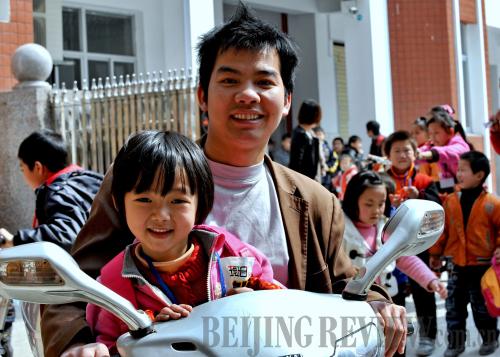|
 |
|
SHOWING MORE CARE: Wu Weimin, a migrant worker from southwest China's Chongqing, picks up his daughter from a primary school set up for migrant workers' children in Jinjiang, southeast China's Fujian Province, on February 23 (ZHANG GUOJUN) |
For instance, a lot has been allocated from public finance to facilitate highway construction in cities while the road condition in rural areas is so poor that some of them don't even have access to postal services. In education, facilities in urban schools are far better than those in rural ones and teachers' wage is also higher.
"Chinese farmers do not have the means to maintain high enough levels of productivity to make money. Because they only have limited land resources, most farmers only work one month a year. If we increase the amount of land they can work on and let them realize scale operations, the income of farmers will be largely increased," said Shang.
On a positive note, the growth speed of rural residents' income has surpassed that of urban residents since 2010. If this trend continues, the gap could be narrowed, said Shang.
"We will take further steps to adjust taxes for high-income groups, strictly standardize supervision of pay and bonuses for senior management in SOEs and financial institutions, expand the proportion of middle-income groups, raise the incomes of low-income groups and promote equal opportunity," Wen said when delivering the government work report.
In Shang's opinion, the minimum wage standard should be raised to enhance low-income residents' salaries. Also, the government should pay attention to low-income groups in cities, such as families where one of the parents has been laid off or where both are without work.
For poverty-stricken groups, Sun suggests the government should improve social security, expand its coverage and enhance its level. "The government has done a lot in this area with tremendous achievements," he said.
Another measure is the wage negotiation mechanism concerning companies and workers' representatives such as the labor union, said Sun. This can ensure the normal mechanisms of wage hike as it gives workers more say and changes the former situation that employers are the only determining factor for wages.
But the income distribution reform will inevitably be hampered by people with vested interests, said Shang.
"There is a long way to go," he said. When conducting wage reform, the government can do it step by step. It can raise the wage of high-income people to a small extent and low-income people to a large extent. Little by little, this can gradually narrow the gap.
Some CPPCC National Committee members disagree with the Central Government's resolution to strictly standardize supervision of pay for senior management in SOEs and financial institutions.
"Compared with their foreign peers, China's top managers in SOEs and financial institutions make much less. It's inappropriate to say their pay and bonuses must be strictly supervised," said Zhang Yichen, CEO of CITIC Capital Holdings Ltd.
Zhang Xiaoji shared that same view. "If the incentive mechanism doesn't exist, how can Chinese SOEs keep talented entrepreneurs?" said Zhang. "If top managers are not well paid, they will definitely go to work for foreign companies."
"We also can't advocate equalitarianism because it will take away steam from the buoyant Chinese economy. The key is establishing a healthy concept in society, said Zhang Xiaoji. For instance, some people in certain Western countries have a healthier mindset. Even if out-earned by surrounding people, they won't feel jealous because they know they will have the same achievements in the future as long as they have equal opportunities. "This is the right approach to this problem," he said.
Email us at: yushujun@bjreview.com | 